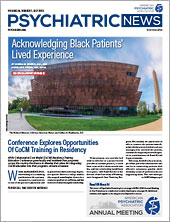While Anna Ratzliff, M.D., Ph.D., was working as a consulting psychiatrist with a primary care practice, a patient went to one of the practice’s physicians and explained that she was having a depressive episode. She was a college student who stopped attending her classes; as a result, her grades were suffering, and she was worried about losing her scholarship.
“If the primary care provider had tried to refer her to a mental health provider in another practice, it could have come with a three-month wait list, and her scholarship would have been gone,” said Ratzliff, who is the director of the University of Washington’s Integrated Care Training Program. But instead, the physician was able to connect the patient immediately with the practice’s behavioral care manager, who assessed the patient, confirmed a major depressive diagnosis in consultation with Ratzliff, and began treatment.
This story, Ratzliff said, is an example of how powerful collaborative care can be in connecting patients with effective treatment quickly while ensuring teams of professionals are supporting them. The care manager was able to use evidence-based measurements to frequently assess the patient, as well, and saw her multiple times a week when necessary. Oftentimes, in a typical psychiatric practice, the psychiatrist may not be able to see the patient again until eight weeks after the initial assessment, Ratzliff pointed out.
Ratzliff shared this story at APA’s Collaborative Care Model (CoCM) Residency Training Education Conference in late April. Faculty members and residents from residency programs across the country attended. The programs represented several specialties, including general psychiatry, family medicine, and pediatrics. More than 55 programs were represented, though over 120 applied. Kristin Kroeger, APA’s chief of Policy, Programs, and Partnerships, said the goal is to schedule another conference in the near future so more programs can send attendees.
“Psychiatrists make up only about 6% of the mental health workforce,” APA President Rebecca Brendel, M.D., J.D., said at the conference. “Up to about 60% of patients get their mental health care in primary care settings, not psychiatric settings. … That’s why it’s so extraordinarily important for us to look at collaborative care and other evidence-based, measurement-based models that really extend the reach of mental health care in conjunction with primary care and pediatric practices.”
During the two-day conference, attendees heard from experts and worked on their own action plans to implement CoCM education into their programs. They shared their action plans and received feedback. Some plans focused on implementing CoCM in underserved primary care clinics with PGY-3 psychiatry residents with direct supervision. Other attendees shared their intentions to educate their colleagues, including both trainees and faculty members, about CoCM and eventually create a CoCM rotation.
There are several benefits to learning about CoCM as residents, said Ratzliff, who is also the co-director of the University of Washington AIMS (Advancing Integrated Mental Health Solutions) Center and director of the university’s psychiatry residency training program. One benefit is that learning about CoCM provides an important opportunity to discuss the limited access that many communities have to mental health care, while also offering a strategy to address this need by leveraging their psychiatric expertise through a team-based approach.
Ratzliff also emphasized that incorporating collaborative care into residency training supports good team communication and strengthens residents’ knowledge of measurement-based treatments and the importance of measuring the quality of mental health care delivery.
Finding the time to teach CoCM is one of the biggest challenges, both for trainees and faculty, said Ramanpreet Toor, M.D., an assistant professor in the University of Washington Department of Psychiatry and Behavioral Sciences, who gave the attendees advice on integrating CoCM into their programs. But there are ways to overcome that, she said, such as by leveraging technology when possible, utilizing asynchronous education techniques, and ensuring that the responsibility for teaching the collaborative care curriculum is shared and does not fall on a single person.
Toor said she is passionate about CoCM for a multitude of reasons. It ensures good communication among team members with the shared goal of helping their patients improve. This shared responsibility can help prevent burnout, she added. Further, being on a team with a diverse group of professionals has allowed Toor the opportunity to learn more herself, she said.
“The more psychiatrists who are prepared to work in collaborative care and other integrated care settings, the better,” Ratzliff told Psychiatric News. “This will allow new career opportunities for psychiatrists and offer more support to the communities we serve.” ■

